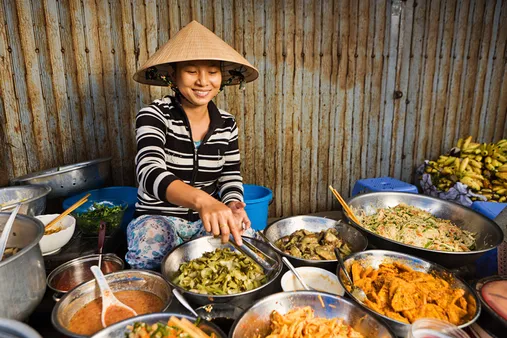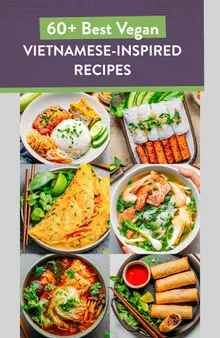Table of Contents
Welcome to Tauhuichiban, your ultimate guide to The vegetarian and vegan options in Vietnamese food. Immerse yourself in the vibrant flavors and rich traditions of Vietnamese cuisine, where plant-based dishes are not just an afterthought but a culinary art form. From traditional favorites to modern interpretations, we'll guide you through the history, health benefits, challenges, and popular dishes of Vietnamese vegetarian and vegan cuisine. Whether you're a seasoned plant-based enthusiast or simply curious about exploring new culinary horizons, this comprehensive guide will empower you to navigate Vietnamese menus with confidence and savor the delectable flavors of Vietnam's plant-based offerings.
I. Vegan and Vegetarian Cuisine in the Vietnamese Culinary Landscape
Plant-based cuisine has a vibrant presence in Vietnam's rich culinary tapestry, reflecting a deep-rooted tradition of vegetarianism and veganism. Throughout history, religious and cultural beliefs, such as Buddhism and Taoism, have significantly influenced the development of vegetarian dishes, leading to an array of flavorful and diverse options for those adhering to plant-based diets.
Vegan Options in Vietnamese Cuisine | |
|---|---|
Bún chả giò | Crispy spring rolls filled with vegetables served with vermicelli noodles |
Gá»i cuá»n | Fresh spring rolls filled with vegetables, tofu, and herbs |
Phá» chay | Vegetarian pho with vegetable broth |
Bánh xèo chay | Crispy vegan pancakes made with rice flour and vegetables |
Lẩu chay | Hot pot with a variety of vegetable ingredients |
In addition to traditional vegetarian dishes, Vietnam has also embraced contemporary vegan cuisine, expanding the choices available to meet the growing demand for plant-based options. Many restaurants in major cities and tourist destinations cater specifically to vegan diners, offering a wide range of dishes inspired by both Vietnamese and international flavors. Vegan versions of popular non-vegetarian dishes, such as banh mi and cao lau, are also gaining popularity.

Vegan and Vegetarian Cuisine in the Vietnamese Culinary Landscape
II. An Exploration of Vietnamese Vegan and Vegetarian Staples
Vietnamese cuisine is renowned for its vibrant flavors and diverse culinary traditions. While meat-based dishes are prevalent, Vietnam also boasts a rich array of vegan and vegetarian options that cater to various dietary preferences and ethical choices. This article delves into the heart of Vietnamese vegan and vegetarian staples, exploring their unique characteristics, health benefits, and cultural significance.
One of the cornerstones of Vietnamese vegan cuisine is the humble tofu. Made from coagulated soy milk, tofu is a versatile ingredient that can be steamed, fried, or grilled to create a variety of textures and flavors. Its mild taste makes it an ideal base for absorbing the bold flavors of Vietnamese sauces and marinades. Tofu is a rich source of protein, iron, and calcium, making it a nutritious addition to any vegan or vegetarian diet.
Tofu Dishes | Description |
|---|---|
Tofu Stir-Fry | Tender tofu tossed in a flavorful sauce with vegetables |
Tofu Banh Xeo | Crispy rice pancakes filled with tofu and vegetables |
Tofu Pho | A hearty noodle soup with tofu and a savory broth |
Another essential ingredient in Vietnamese vegan cooking is tempeh. Made from fermented soybeans, tempeh has a nutty flavor and a firm texture that makes it a great meat substitute. It is a rich source of protein, fiber, and probiotics, which support gut health. Tempeh can be grilled, steamed, or fried and is often used in stir-fries, salads, and soups.
In addition to tofu and tempeh, Vietnamese cuisine offers a wide range of vegetables, fruits, and herbs that form the foundation of many vegan and vegetarian dishes. Vegetables such as bok choy, water spinach, and morning glory are commonly used in stir-fries, soups, and salads. Fruits like mango, papaya, and pineapple add a touch of sweetness and freshness to various dishes. Herbs such as cilantro, basil, and mint provide aromatic and flavorful accents.
- Vietnamese Spring Rolls (Goi Cuon): Fresh rice paper rolls filled with vegetables, herbs, and tofu or tempeh
- Banh Xeo: Crispy rice pancakes filled with vegetables, tofu, or tempeh
- Cao Lau: A noodle dish from Hoi An made with rice noodles, vegetables, and crispy wontons
Vietnamese vegan and vegetarian cuisine is not only delicious but also offers numerous health benefits. The abundance of vegetables, fruits, and herbs provides essential vitamins, minerals, and antioxidants. Tofu and tempeh are excellent sources of plant-based protein, iron, and calcium. The use of fresh ingredients and traditional cooking methods ensures that dishes retain their nutritional value.
Beyond its nutritional benefits, Vietnamese vegan and vegetarian cuisine holds cultural significance. Many Buddhist temples in Vietnam offer vegetarian meals to their followers, and vegetarian dishes are often served during religious festivals and celebrations. The emphasis on fresh, seasonal ingredients reflects the Vietnamese philosophy of living in harmony with nature.
In conclusion, Vietnamese vegan and vegetarian cuisine is a vibrant and diverse culinary tradition that offers a delicious and nutritious alternative to meat-based dishes. With its wide range of ingredients, flavors, and textures, Vietnamese vegan and vegetarian cuisine caters to various dietary preferences and ethical choices while showcasing the country's rich culinary heritage.

An Exploration of Vietnamese Vegan and Vegetarian Staples
III. Savoring the Nuances of Vietnamese Vegan and Vegetarian Dishes
The vegetarian and vegan options in Vietnamese cuisine offer a tantalizing array of flavors and textures that cater to diverse dietary preferences. From traditional dishes to modern interpretations, this guide explores the vibrant world of plant-based Vietnamese food, empowering you to make informed choices and savor the delectable offerings of Vietnam's culinary heritage.
The history of vegetarianism and veganism in Vietnam is deeply intertwined with Buddhist traditions. Many Buddhist temples have long served meatless meals to their followers, and this practice has influenced the development of vegetarian and vegan dishes throughout the country. Today, vegetarian and vegan options are widely available in restaurants and homes across Vietnam, reflecting the growing demand for plant-based cuisine.
Dish | Description |
|---|---|
Bún chả chay | A vegetarian version of the popular grilled pork noodle dish, made with tofu or seitan instead of pork. |
Phá» chay | A vegetarian version of the classic Vietnamese beef noodle soup, made with a flavorful vegetable broth and tofu or seitan. |
Gá»i cuá»n chay | Fresh spring rolls filled with vegetables, tofu, and rice noodles, served with a peanut dipping sauce. |
The health benefits of a vegetarian or vegan diet are well-documented. Plant-based diets are typically lower in saturated fat and cholesterol than meat-based diets, and they are rich in fiber, vitamins, and minerals. Studies have shown that vegetarian and vegan diets can reduce the risk of heart disease, stroke, type 2 diabetes, and certain types of cancer.
Finding vegetarian and vegan options in Vietnamese food can be challenging, especially in traditional restaurants. However, with a little research, it is possible to find a wide variety of plant-based dishes to enjoy. Many Vietnamese restaurants offer vegetarian and vegan versions of their popular dishes, and there are also a number of dedicated vegetarian and vegan restaurants in major cities.
Here are some tips for finding vegetarian and vegan options in Vietnamese food:
- Look for restaurants that have a separate vegetarian or vegan menu.
- Ask your server about vegetarian and vegan options.
- Check online reviews to see if other diners have recommended vegetarian or vegan dishes at a particular restaurant.
- Be prepared to make substitutions. For example, you can ask for tofu or seitan instead of meat in a dish.
Once you've found a vegetarian or vegan dish that you enjoy, be sure to savor the flavors and textures. Vietnamese cuisine is known for its use of fresh ingredients and flavorful sauces, and vegetarian and vegan dishes are no exception. Enjoy the vibrant flavors of Vietnam's plant-based culinary offerings!
IV. Venturing into the World of Vietnamese Vegan and Vegetarian Substitutes
The vibrant culinary landscape of Vietnam offers a plethora of delectable options for vegetarians and vegans alike. Beyond the traditional meat-centric dishes, Vietnamese cuisine boasts an array of plant-based substitutes that tantalize the taste buds and cater to diverse dietary preferences. These substitutes, crafted from fresh vegetables, legumes, and other natural ingredients, provide a symphony of flavors and textures that rival their meat-based counterparts.
One of the most popular vegetarian substitutes in Vietnamese cuisine is tofu, made from coagulated soy milk. Its versatility knows no bounds, as it can be grilled, fried, steamed, or stir-fried, absorbing the flavors of the accompanying ingredients. Another beloved substitute is tempeh, a fermented soybean product with a nutty flavor and chewy texture. It is often used in stir-fries, soups, and salads, adding a hearty and protein-rich element to the dish.
Tofu | Tempeh |
|---|---|
Made from coagulated soy milk | Fermented soybean product |
Versatile, can be grilled, fried, steamed, or stir-fried | Nutty flavor, chewy texture |
Absorbs flavors of accompanying ingredients | Often used in stir-fries, soups, and salads |
For those seeking a meaty texture, seitan is an excellent choice. Made from wheat gluten, seitan has a firm and chewy consistency that mimics the texture of meat. It is often used in stir-fries, curries, and stews, providing a satisfying and protein-packed alternative to animal products.
In addition to these widely used substitutes, Vietnamese cuisine also features a variety of lesser-known plant-based options. Jackfruit, with its fibrous texture, is often used as a substitute for pulled pork in sandwiches and tacos. Lotus root, with its crunchy texture and mild flavor, is a popular ingredient in salads and stir-fries. And mung bean sprouts, with their fresh and crunchy texture, add a vibrant touch to salads, soups, and spring rolls.
- Seitan: Made from wheat gluten, firm and chewy texture
- Jackfruit: Fibrous texture, used as a substitute for pulled pork
- Lotus root: Crunchy texture, mild flavor, used in salads and stir-fries
- Mung bean sprouts: Fresh and crunchy texture, used in salads, soups, and spring rolls
The incorporation of these vegetarian and vegan substitutes into Vietnamese cuisine has not only expanded the culinary options for those with dietary restrictions but has also enriched the flavors and textures of traditional dishes. These substitutes, with their unique characteristics and versatility, have become integral to the vibrant tapestry of Vietnamese cuisine, offering a delicious and nutritious alternative to meat-based ingredients.
V. Conclusion
The vegetarian and vegan options in Vietnamese food are as diverse and flavorful as the country itself. From traditional dishes that have been enjoyed for centuries to modern interpretations that showcase the creativity of Vietnamese chefs, there is something to satisfy every palate. Whether you're looking for a quick and easy meal or a special occasion feast, you're sure to find something to your liking. As the world becomes increasingly aware of the environmental and health benefits of a plant-based diet, the vegetarian and vegan options in Vietnamese food are sure to continue to grow in popularity. With a little bit of effort, you can easily find delicious and satisfying vegetarian and vegan meals in Vietnam.